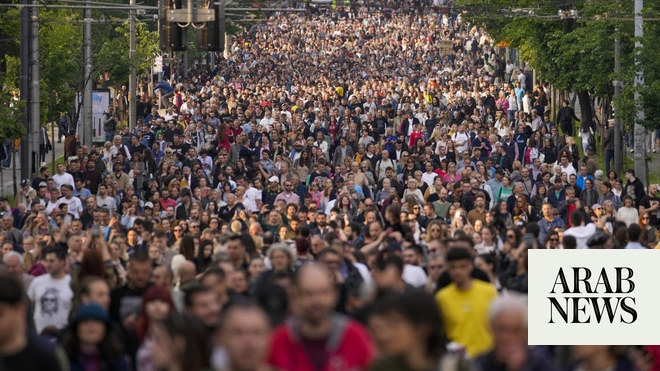
On Thursday, Bouteflika issued his first warning to protesters, saying the unrest — the biggest since the 2011 “Arab Spring” — could destabilize Algeria
The president has not spoken in public since suffering a stroke in 2013, and is currently in hospital in Geneva
ALGIERS: Tens of thousands protested across Algeria on Friday in the biggest rallies yet against ailing President Abdelaziz Bouteflika’s bid for a fifth term, despite the defiant leader’s warning of the risk of “chaos.”
A march in the capital Algiers was slowed to a near-crawl by the huge numbers taking part, swelled by women marking International Women’s Day and chanting “No fifth term — hey, Bouteflika!“
Waving Algeria’s green-white-and-red flags, men and women converged on the city’s landmark Grand Post Office square after weekly prayers.
“The people are here, from all social classes, from the youngest to the eldest, everyone is saying ‘no to a fifth term, please, leave, you won’t even be judged’,” said Kamel, a 37-year-old protester in the capital.
The police fired tear gas and stun grenades to disperse those who tried to force their way through a police cordon that was blocking access to a road leading toward the presidency, an AFP journalist said.
While demonstrators dispersed calmly as darkness fell, small groups of young people clashed with the police.
The unrest left 112 members of the security forces injured, according to police, who said they had arrested 195 people suspected of “vandalism.”
The overall atmosphere through the day was calm and festive, and numerous people attended with their children.
Huge crowds — again far surpassing those seen the previous Friday — also protested in the second and third cities of Oran and Constantine, local journalists on the ground told AFP.
A journalist in Oran said the whole city “is out (on the streets)... this has never been seen before.”
Major demonstrations were reported in other cities across the country by security sources, Algerian media and social networks.
In a message released on Thursday night, Bouteflika — who uses a wheelchair and has rarely been seen in public since a 2013 stroke — warned that troublemakers may try to infiltrate the demonstrations.
“Many of our fellow citizens” have demonstrated across the North African country “to peacefully express their views,” he said.
“However, we must call for vigilance and caution in case this peaceful expression is infiltrated by some insidious party... which could cause chaos,” he said, without mention of the demands that he abandon his bid to seek re-election on April 18.
Bouteflika flagged the risk of a return to the “national tragedy” of Algeria’s decade-long civil war in the 1990s and of the “crises and tragedies caused by terrorism” in neighboring countries.
The head of state has been in Switzerland since February 24 for what the presidency describes as “routine medical tests,” and a date for his return home has not yet been announced.
Swiss police said Rachid Nekkaz — a businessman and political activist opposed to Bouteflika — was arrested on Friday outside the Geneva hospital where the president is being treated.
He will be held overnight and appear before a prosecutor on Saturday, police spokesman Jean-Philippe Brandt told AFP.
Nekkaz fell foul of Algerian electoral laws because he has previously held French nationality and stood aside for a cousin of the same name to run on his behalf.
Algeria has largely avoided the conflicts unleashed by the Arab Spring uprisings that brought down rulers in neighboring Tunisia and Libya.
But discontent, particularly among the young, turned to anger after the veteran leader announced on February 10 that he would seek another term.
Calls had circulated widely on social media under the hashtag “March 8 Movement” for massive but peaceful demonstrations in the capital and cities across the North African state on Friday.
“I will not throw a single stone!” and “No windows will be smashed,” were among “18 commandments” sent out to participants by poet and writer Lazhari Labter, as well as instructions to clean up streets after the protests.
He also called for demonstrators to turn the event into “a day of celebration” and one of “love, faith, Algerian flags and roses.”
Michael Ayari, an analyst for the International Crisis Group, told AFP that there is no “anti-police (or) anti-army dimension” to the protests, unlike the beginning of the Arab Spring in Tunisia in 2011.
He said “the army could try to steer a possible transition process,” citing retired general Ali Ghediri — a presidential candidate — as a potential consensus choice.
Despite a ban dating back to 2001, demonstrations have been staged almost daily in Algiers since a massive rally two weeks ago.
Around 1,000 lawyers took to the streets of Algiers on Thursday, arguing that the president’s ill health should disqualify him from the race.
They breached police cordons to march on the Constitutional Council, the body tasked with approving the candidacy of those registered to contest the poll.











